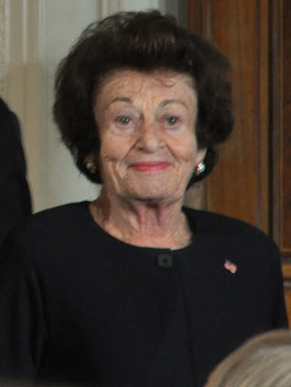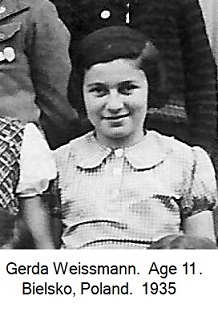Gerda Weissmann Klein facts for kids
Quick facts for kids
Gerda Weissmann Klein
|
|
|---|---|

Klein in 2011
|
|
| Born | Gerda Weissmann May 8, 1924 Bielsko, Poland |
| Died | April 3, 2022 (aged 97) Phoenix, Arizona, U.S. |
| Occupation | Writer, human rights activist |
| Notable works |
|
| Spouse |
Kurt Klein
(m. 1946; |
Gerda Weissmann Klein (May 8, 1924 – April 3, 2022) was a Polish-born American writer and human rights activist. Her autobiographical account of the Holocaust, All but My Life (1957), was adapted for the 1995 short film, One Survivor Remembers, which received an Academy Award and an Emmy Award, and was selected for the National Film Registry. She married Kurt Klein (1920–2002) in 1946.
The Kleins became advocates of Holocaust education and human rights, dedicating most of their lives to promoting tolerance and community service. A naturalized U.S. citizen, Gerda Weissmann Klein also founded Citizenship Counts, a nonprofit organization that champions the value and responsibilities of American citizenship. She has served on the governing board of the United States Holocaust Memorial Museum, which features her testimony in a permanent exhibit.
On February 15, 2011, Klein was presented with the Presidential Medal of Freedom, the highest civilian award in the United States.
Contents
Early life
Gerda Weissmann, the second child of manufacturing executive Julius Weissmann and Helene (née Mueckenbrunn) Weissmann, was born May 8, 1924, in Bielsko (now Bielsko-Biała), Poland. She attended Notre Dame Gymnasium in Bielsko until the Germans invaded Poland in 1939. Both of her parents and her older brother Arthur (b. 1919) were murdered in the Holocaust.
Life under the Nazis
On September 3, 1939, German troops invaded fifteen-year-old Weissmann's home in Bielsko, Poland. Shortly after the invasion began, the family received a telegram from Gerda's uncle saying the Germans were advancing quickly, and the family should leave Poland immediately. They stayed because Gerda's father had suffered a heart attack. His doctors advised that he not be moved or subjected to undue stress.
In 1942, Julius Weissmann was sent to a death camp where he was murdered. Not long afterwards, the ghetto where Weissmann Klein and her mother lived was liquidated. Helene Weissman was forced into a group slated for a death camp; Gerda, deemed fit for work, was sent to a labor camp. As she and others boarded trucks, Gerda jumped out in a frantic effort to reunite with her mother. According to Weissmann Klein's account, Moshe Merin, head of the local Jewish Council Judenrat, threw her back in her truck, saying "You are too young to die."
Liberation
In May 1945, Weissmann was liberated by forces of the United States Army in Volary, Czechoslovakia; these forces included Lieutenant Kurt Klein, who was born in Germany. A teenage Klein immigrated to the United States in 1937 to escape Nazism. Klein's parents were murdered at Auschwitz concentration camp. When Kurt Klein first encountered Gerda Weissmann, who was one day short of her 21st birthday, she was white-haired, weighed 68 pounds, and dressed in rags. When she hesitantly informed Klein she was a Jew, he emotionally revealed that he was Jewish as well. After a courtship of several months, Gerda and Kurt were engaged in September 1945. Diplomatic and immigration restrictions delayed their wedding for a year, but Kurt finally returned to Europe from the U.S. in 1946 and they were married in Paris.
Life after the War
After the war, the Kleins moved to and raised three children in Buffalo, New York, where Kurt ran a printing business and Gerda became a writer and spent 17 years as a columnist for The Buffalo News.
The documentary, One Survivor Remembers, (1995) based on Gerda Klein's autobiography, All But My Life, produced and directed by Kary Antholis, and distributed by HBO Films, won the 1995 Academy Award for Best Documentary (Short Subject).
Weissmann Klein has published several memoirs and children's stories, including The Windsor Caper (2013), a weekly serial in The Buffalo News during the 1980s, about two American girls who have a night-time adventure in Windsor Castle, England. Weissmann Klein describes it as her only work that is "not rooted in pain".
Weissmann Klein lived in Buffalo for several decades until her husband Kurt retired and they moved to Arizona in 1985 to be closer to their children and grandchildren. She died in Phoenix on April 3, 2022, at the age of 97.
Awards and recognition
Presidential Medal of Freedom
On February 15, 2011, President Barack Obama presented Weissmann Klein and 14 other recipients with the 2010 Presidential Medal of Freedom the highest civilian award in the United States. At the ceremony in the East Room of the White House, President Obama announced, "This year's Medal of Freedom recipients reveal the best of who we are and who we aspire to be."
President Obama then read a statement from Weissmann Klein: "I pray you never stand at any crossroads in your own lives, but if you do, if the darkness seems so total, if you think there is no way out, remember, never ever give up."
Additional recognition
Weissmann Klein was selected to be the keynote speaker at the United Nations' first annual International Holocaust Remembrance Day in January 2006. She spoke to school children and traveled the world to spread her message of tolerance and hope, meeting with world leaders. In 1996, Weissmann Klein received the international Lion of Judah award in Jerusalem. She received an honorary doctorate in Humane Letters from Rosary Hill College in 1975.
In 1997, President Bill Clinton appointed Weissmann Klein to the United States Holocaust Memorial Museum's Governing Council. In 2007, the museum bestowed Weissmann Klein with its highest honor at The Arizona Biltmore before 1,000 guests. She was inducted into the Arizona Women's Hall of Fame in 2021.
Filmography
- 1995: One Survivor Remembers
- 1996: 60 Minutes: "One Survivor Remembers" CBS
- 2005: About Face: The Story of the Jewish Refugee Soldiers of World War II
See also
 In Spanish: Gerda Weissmann Klein para niños
In Spanish: Gerda Weissmann Klein para niños


